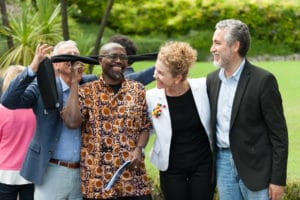This post originally appeared on The Rockefeller Foundation’s blog.
During the last three weeks, I have had the pleasure of leading sessions during the thematic month on human behavior at The Rockefeller Foundation Bellagio Center, observing as the residents share their perspectives and question everything, including each other’s assumptions, to uncovering surprising connections and new problem-solving approaches. I am thrilled to see camaraderie develop among the 13 academics, artists, and practitioners from diverse fields gathered here in Lake Como, Italy to work on their individual innovative projects and collectively apply a human behavior lens to pressing challenges across the globe.
At any given moment animated debate springs up amongst the residents: from fixing public schools in the U.S., to improving neonatal care for India’s poorest families, to using data to foster social cohesion. And new insights emerge: residents have uncovered unexpected parallels between politics in Kenya, India, and the United States. An artist was struck by the aesthetic possibilities presented by a behavioral economist’s trust experiments in marginalized, vulnerable communities; and a researcher of post-catastrophe resilience mulled over the possibility of using these experiments as a way to stimulate recovery from natural disasters. Enthusiasm is high as the discussions of the day often continue over dinner and then late into the night.
I am most encouraged by the impact the group discussions have had on participants’ individual projects—demonstrating the promise of a conversation to spark new ideas and enhance understanding. Juan-Camilo Cárdenas, an experimental economist from Colombia, likened this residency experience to the coming together of many chefs, each concerned with food and cooking in his or her own way. As he explained it, everyone approaches cooking with a different set of techniques, ingredients, and tools. Some may be more interested in the science of cooking, some in the aesthetics, and some in the nutritional value—but each has expertise to share. Exchanging that expertise unleashes rich new flavors and ultimately enhances each person’s cooking. Already Cárdenas is beginning to see new ingredients to inform his work with fishing communities in Baru, Colombia.
For some residents, these new ingredients are already being used to update existing recipes. Vishwajeet Kumar recently had a late-night call with his team in India to tell them about the ideas that have come out of discussing his work at the Bellagio Center. Kumar leads a remarkable effort to improve maternal and child health by increasing the use of “Kangaroo Mother Care” (KMC), a profoundly simple method of care for preterm infants in which a mother carries her baby with skin-to-skin contact. He has already asked his team to explore the possibility of testing and implementing new behaviorally-informed ideas he’s garnered from the residency to help spread this under-utilized technique. For example, he’s considering using the concept of ‘social proof,’ where seeing others like oneself do something enhances its acceptability, or addressing long-held perceptions of what incubators do to make KMC the default method of care rather than an alternative.
The Rockefeller Foundation Bellagio Center has been a remarkable catalyst for thought, discussion, analysis, and insight over the past weeks. The diversity of the group’s expertise together with the serenity of the location has unlocked a truly collaborative environment amongst individuals who’ve only known each other for a few weeks as they explore ways to apply behavioral science to their problem solving approaches. As the thematic month comes to a close, I am energized and excited about the individual projects and collective body of work to come.



